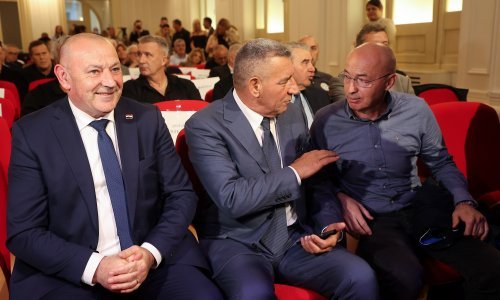Dinko Buric, a representative of the regional HDSSB party in the Croatian parliament, said on Wednesday that the verdict of the Hague tribunal against Croatian generals Ante Gotovina and Mladen Markac was a verdict against the Croatian state and people and the continuation of criminalisation of the Homeland War, a position which deputies of the HDZ, IDS and HNS parties dismissed as an attempt to politicise the issue.
"On that day (April 15), not only were the generals convicted in The Hague, but all war veterans, the Homeland War and the entire nation. The victors in the war were defeated in peace," Buric said after he requested a break in the session and the request was granted.
Commenting on the term 'joint criminal enterprise' in the Hague verdict, Buric said that a joint anti-Croatian criminal enterprise was under way in Croatia, which he said had particularly gained momentum after the death of the first Croatian president, the late Franjo Tudjman.
Buric accused the most senior representatives of the state authorities of involvement in that enterprise, including former President Stjepan Mesic, former Prime Minister Ivica Racan, former PM Ivo Sanader, incumbent PM Jadranka Kosor, Deputy Parliament Speaker Vladimir Seks, and Chief State Prosecutor Mladen Bajic.
He said that senior state officials were expressing their shock at the Hague verdict, while at the same time they did not want to admit that the Homeland War was described as a joint criminal enterprise also in the verdict against Branimir Glavas.
Glavas is the first Croatian politician convicted by a Croatian court for war crimes against civilians in Osijek in the early 1990s.
Vesna Pusic of the Croatian People's Party (HNS) then took the floor, telling Buric that it was intolerable that he was trying to cover up someone's individual responsibility with the entire Homeland War.
"The fact that the severity of the verdict has caused shock in Croatia gives no one the right to say untruths such as that the verdict criminalises the Homeland War, that it describes Operation Storm as a joint criminal enterprise or that the entire Croatian people has been convicted. The Croatian Supreme Court ruled on very concrete crimes (in Glavas's case) and it did not comment on Operation Storm in any way," said Pusic.
Andrija Hebrang of the Croatian Democratic Union (HDZ) called on Buric to stop politicising the issue and let state institutions defend the truth about the Homeland War.
He said it had been difficult lately to listen about Serb civilian victims, considering that no one had been called to account for 8,000 killed Croat civilians, and that it was difficult to accept statements by the Croatian Helsinki Committee for Human Rights (HHO) about civilians killed during and in the wake of Operation Storm because "a civilian is a person who has been found to be a civilian."
Damir Kajin of the Istrian Democratic Party (IDS) said the dignity of the Croatian people was not compromised by the Hague tribunal, but by those who had destroyed the country economically.
The Hague tribunal is not responsible for the criminalisation of the Homeland War either - those who are responsible for it are Tudjman's ministers who in 1998 prevented Gotovina from "giving a statement to investigators of the Hague tribunal because the (generals') defence wanted primarily to plunder the state budget," said Kajin.
Earlier in the day, Damir Jasarevic, leader of the association of war veterans from Zagreb who took part in the defence of Vukovar, told reporters that the HDZ parliamentary group decided before the start of today's parliamentary session that the parliament would not talk about the association's request to discuss the situation in the country after the announcement of the Hague tribunal's verdict and the parliamentary declaration about the Homeland War.
Jasarevic said that he stopped the hunger strike he had been on in protest against the Hague verdict at the urging of his doctor.
































